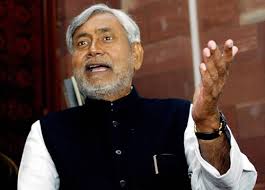Rahul Gandhi tearing up the ordinance was a farce, says Nitish Kumar
 PATNA : Bihar Chief Minister Nitish Kumar today said that Rahul Gandhi delivered little more than a publicity stunt when he tore up an ordinance at a press conference late last year, a move meant to signal his determination to fight corruption.
PATNA : Bihar Chief Minister Nitish Kumar today said that Rahul Gandhi delivered little more than a publicity stunt when he tore up an ordinance at a press conference late last year, a move meant to signal his determination to fight corruption.“It was a farce,” said the Bihar Chief Minister. His appraisal is based on the fact that Mr Gandhi, who is the vice-president of the Congress, has decided to ally for the national election with Mr Kumar’s political rival, Lalu Prasad.
Mr Prasad left jail in December after being granted bail by the Supreme Court in a corruption case. He heads the Rashtriya Janta Dal or RJD and has often bailed out the Congress-anchored coalition at the Centre during important votes in Parliament.
In September 2012, the union cabinet approved an executive order that would protect politicians convicted of serious crimes from being evicted from Parliament, a decision taken by the Supreme Court in July.
The ordinance was seen as a clear move to thwart the court judgement and it would have come to the rescue of Mr Prasad.
Mr Gandhi trashed the ordinance as “nonsense” and it was withdrawn by the Cabinet. His new partnership with Mr Prasad allows political opponents to allege political inauthenticity. But Mr Gandhi’s coalition in Bihar with Mr Prasad covets the complex caste dynamics of the state, which elects 40 parliamentarians.
In 2004, the Congress tied up with Mr Prasad and another regional leader, Ram Vilas Paswan, for a dream run, winning 22 seats. Mr Prasad was rewarded with the post of the country’s Railways Minister.
In 2009, the alliance ended and the Congress emerged with two seats.

